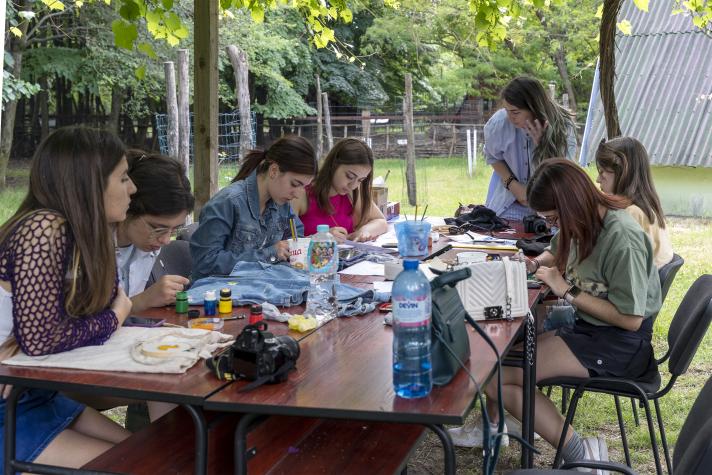By Radost Lozanova
In recent years, the fashion industry has come under scrutiny for its harmful impact on the environment. And the EU has recognised the importance of tackling the issue. In response to this, a series of events focusing on sustainable fashion have emerged, aiming to raise awareness and promote eco-friendly practices.
I was invited to the opening of the ReSet the Trend campaign at the beginning of this year which inspired me to persist in my efforts to promote change in the fashion system. This article highlights some of the events I co-organised and the key takeaways that can guide us towards a greener and more ethical future.
Fashion Forward: Crafting a Green Future (Olomouc, Czech Republic):
The event hosted at Palacký University in Olomouc showcased the dangers of fast fashion trends and the role of social media in fostering communities of change. Participants were encouraged to revamp their old clothing through embroidery and textile painting workshops, promoting creativity and individuality in sustainable fashion choices. The event emphasized the transformative power of education and hands-on experiences in inspiring change.
Sustainable Wardrobe for a Green Future Vol.2 (Sofia, Bulgaria):
Building on the success of a previous event, with AEGEE-Sofia we organized a second edition of a clothing swap accompanied by workshops and lectures. Expert speakers from second-hand clothing companies and clothing sorting organizations shared insights on the negative impacts of fast fashion. Interactive workshops provided attendees with practical skills and knowledge on refreshing their wardrobes sustainably. The highlight of the event was the clothing swap, promoting a circular economy and reducing textile waste. Sustainability was incorporated into every aspect of the event's execution, emphasizing the importance of practicing what we preach.
Tailors of Sustainability (Dobrich, Bulgaria):
Inspired by the EU campaign ReSet the Trend, the "Tailors of sustainability" in Dobrich aimed to bring together young people and provide them with a platform to showcase their creativity and upcycling skills. The event fostered an educational environment through presentations that raised awareness about the fashion industry's issues. By holding the event in a park with animals, the connection between people and the environment was reinforced. High-school students were actively engaged in discussions about their clothing practices, consumer habits, and the role of social media in shaping their choices. The results show that while social media affects consumer choices, it can also be used to promote sustainable practices.
Lessons Learned:
1. Education and Awareness: Events on sustainable fashion play a crucial role in educating people about the environmental and social impacts of the fashion industry. By raising awareness and providing factual information, individuals are empowered to make more conscious choices.
2. Hands-On Experiences: Workshops and interactive activities enable participants to engage directly with sustainable fashion practices. By acquiring skills like sewing, upcycling, and textile painting, individuals can take an active role in transforming their wardrobes and reducing their environmental footprint.
3. Collaboration and Networking: Sustainable fashion events bring together like-minded individuals, activists, and professionals, fostering a network of changemakers. Collaboration enables the sharing of ideas, knowledge, and resources, amplifying the impact of sustainable fashion initiatives.
4. Embracing a Circular Economy: Clothing swaps and upcycling workshops promote the concept of a circular economy, where garments are reused and repurposed instead of being discarded. This reduces textile waste and encourages sustainable consumption habits.
5. The Role of Social Media: While social media is contributing to overconsumption and fast fashion, it offers a platform for sustainability advocates to educate and mobilize communities, empowering consumers to make informed choices and drive demand for sustainable fashion.
6. Sustainability in Event Execution: Organizers of sustainable fashion events should prioritize sustainability in every aspect of the event, from utilizing eco-friendly materials to minimizing waste and implementing recycling initiatives. Leading by example helps reinforce the message being conveyed.
To conclude, the series of events focused on sustainable fashion have been instrumental in raising awareness and inspiring positive change in the fashion industry across Europe among different target groups. By educating individuals, promoting hands-on experiences, fostering collaboration, and embracing a circular economy, these events have showcased the path to a greener and more ethical future. Meanwhile, the lessons learned from these events provide a roadmap for future initiatives.

